The economy freeze has been lifted and businesses are springing back to life. There is a relief in the air; but fear too as the pandemic hasn’t subsided down yet. In just over three months, our perceptions about life and surviving in this unpredictable world has changed drastically. It has made us re-think and re-plan our financial behaviour.
As we gradually reopen our markets to fix the economic curve, we can’t help but ponder over how this white swan event has disrupted the real estate sector in a minuscule period of time.
Though the pandemic has proved to be a dampener to the resurrection plans of the real estate sector, the road ahead seems optimistic for the real estate sector owing to renewed consumer confidence, realization of the importance of buying homes, and reduction of home loan rates.
To give our readers a glimpse of how the homebuyers’ opinions and buying behaviour towards real estate have changed over the past few months, we have compiled an analysis of the real estate sector through a pre-lockdown and post-lockdown synopsis.
Real estate sector before lockdown
If we can remember, before lockdown, the real estate sector was contended with the physical nature of conducting business. Adoption of technology in real estate was happening in dribs and drabs and real estate developers didn’t give two hoots about the importance of tech acquisition in real estate.
The home-buying process on the other hand seemed unending and frustrating for homebuyers. Home seekers had to wade through mind-boggling property documentation procedures which took away the charm of shopping for homes. Not to mention the trouble of physical property visits bearing the weather which sometimes got constrained by time and distance.
There wasn’t an iota of fear relating to hygiene and health and our financial expenditure was more on lifestyle, recreation and food. People’s foresightedness about investing in real estate was absent.
The general consciousness revolved around saving money till retirement and preference of staying in rental homes. Those who bought homes stressed more about the location of the property and less about health amenities and wellness centres.
Real estate sector post lockdown
The real estate sector went through a lightning transition in its operations during the lockdown. Real estate developers went digital and registered good sales.
The use of digital platforms laced with virtual reality, 3D walkthroughs and digital transaction modules, simplified the home-buying equation. Homebuyers raised a toast to this new-fangled homebuying trend.
This digital shift also gave developers a better understanding of buying behaviour with the induction of machine learning and AI technology.
It won’t be pompous to say that digital home-buying will be the new norm in the real estate sector. The demand for asset class has perked up with homebuyers going for near-finished properties rather than new launches, except for the brands they trust.
Homebuyers are now considering real estate as the safest bet and are looking for an immediate investment with the reduction in repo rate and launch of Credit Linked Subsidy Scheme (CLSS) for affordable housing.
The perception of living in crowded places has changed dramatically and the demand for townships and properties with huge green spaces has become the main draw. Amenities and health spaces within projects are top priorities now while selecting a property.
Reverse migration of NRIs and domestic workforce to their hometowns has piqued the interest of real estate developers in Tier II cities and Tier III cities. This will create fresh demand for properties beyond metro cities and give impetus to the real estate sector.
Real estate developers with unfinished inventory will look to finish the projects in the shortest period possible to generate revenue. Use of construction technologies to minimize construction time has become prevalent now, which later will become a norm. With the delay in return of migrant labourers to the cities, dependence on such technologies for modular construction and other labor-intensive jobs will increase.
With the pandemic showing no signs of abatement, it becomes a tough call for businesses to visualize the road ahead. For the moment, the real estate sector will have to get back to the drawing board, comprehend and whip up new innovations in the field of construction technology, home automation, IoT, and AI. And all planning should take place whilst keeping in mind the norms of social distancing, mobility, density, and health etiquette.





